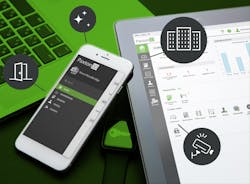2021 Security Industry Business Climate: Paxton

Even as the pace of vaccination accelerates, traces of things that became common in the past year, such as masks and avoiding large crowds, are expected to continue for the foreseeable future, leaving an uncertain road ahead.
Locksmith Ledger is publishing a series of articles that attempt to assess the 2021 Business Climate through the eyes of security industry manufacturers. We want to know how the companies are faring during these troubled times, how they assess the security industry at large and what locksmiths and security pros can do to take advantage of the situation.
Our latest interview in the series was conducted with Jonathan Lach, vice president of sales at Paxton Inc.
What are the prospects for the security industry in 2021?
It’s been a growing industry for many years, and the forecast is that it continues to grow. The fear of the unknown slowly is subsiding, which means that confidence is building in the industry. That presents an opportunity for security companies — access control companies — to provide solutions that not only help to secure premises but also to aid in the implementation of social-distancing measures.
What effect has COVID-19 had on the industry?
2020 was a tough year for many people personally. From a professional point of view, in terms of the effect to the access control industry, I think in the short-term, it has reduced in size. But the long-term effect will be positive as it shines a light on the importance of access control, video management and keeping a building safe, keeping your employee safe and your visitors safe.
What are the prospects for your company in 2021?
It’s maybe good timing for that question. Paxton is seeing significant growth over previous years. We just finished up our Q1, and for Paxton, it was both a record month and a record quarter. We fully expect this to accelerate as the year progresses and market size inflates back to its previous size.
What has put Paxton in position to capitalize?
Access control has a big part to play moving forward. We just launched a new platform called Paxton10 where we’re introducing access control and video management all in one platform. Video management with access control is the No. 1 integration [normally]. We’re just making it simpler for our customers and for our installers and end users to have those two big technologies together in one platform.
When the pandemic arose, that also caused us to look at the performance and functionality that we had in our systems and then to develop some new functions. We introduced something called Occupancy Manager, a way to track how many people are in a building, should a customer want to use it; and Checkpoint Control, to make sure that if someone’s coming in, they don’t have a fever. Whether you use that for COVID or something else, it’s there. We think access control business had a lot of room to grow already, and this just adds to the [potential] going forward.
Do you expect a boom, or will it take time for security dollars to flow back into the industry?
We’ve already started to see the boom. I think the numbers and orders prove it in Q1. We’re training more people than we have before. We’re seeing more customers, so we’re definitely seeing the [potential].
Do you expect that to continue into 2022?
We do. Paxton’s in a situation where we just launched a new platform. We see the cycle of that taking many months: You get it out there; you start to train customers on it; they start to bid it out; and it starts to catch on. We think we’re planning the right seeds to continue to show that growth in 2022.
How much do you expect the lingering effects of the pandemic will affect the industry and your company over the next year?
I don’t think we really know yet. We won’t really know the true impact of the pandemic until more people have been vaccinated and the country opens up a bit more. COVID-19 dramatically changed the way we do business. Social distancing, working from home and virtual meetings have all become commonplace. For example, our team quickly adapted to working from home and put measures in place protecting the safety of our employees. We learned to communicate through virtual means, and now I feel closer to my team than I ever have before. I’ve spent more time face to face, virtually, with my team than I ever had before. The technology that we used to have these meetings really helped us to stay connected.
How much of that work environment do you anticipate will become permanent?
We’ve talked about that quite a bit [at Paxton]. I’m pretty positive that it will be kind of a hybrid type [of work environment]. It’s up to customers to dictate how they want to do business. I believe there will be more than enough interest to start meeting with people face to face. We have [already] where it’s safe. A lot of our customers are asking us to, and they want to. Obviously, safety is No. 1, so where we could do it safely, [we’ll meet them face to face], and where we can’t, we still will have virtual one on ones.
How much would a dual office/work-from-home environment affect commercial security demands and sales?
There’s the thought process that there might be less office space. But technology is interesting. It’s always moving forward. New businesses are coming about because of it. We could talk about, for example, the big opportunity in the cannabis industry, which is growing quickly. There are different types of opportunities for the security space as we move forward. So, it might not be an office building, but there might be two or three different types of opportunities or market segments that take that place.
You mentioned cannabis. What other market segments figure to be stronger as we move forward?
The management of energy use throughout a building is set to become more important. The security industry is in a good position to take up the mantle here, but it will require focus and long-term strategic thinking to capitalize on that opportunity.
How do you foresee the security industry getting involved with energy management?
At Paxton, we talk about the importance of technology being simple, easy to use and all in one space. We use an example of a cellphone. Your cellphone was originally used to place calls 100% of the time, and now I think a lot of us use our cellphone probably the least amount for that. Access control is no different. We look at it as a solution, not just to gain access and have CCTV or video integrated into that, but why not, if you’re leaving a building, that it makes sure all your lights are off and the air goes down to a certain temperature or your blinds close? Or, when you come in [to a building], the lights go on? We’ve already started building products with that in mind, so we see that as a really big opportunity in years to come. We haven’t even scratched the surface with it.
So, it’s bringing the smart home into the access control solution?
Yes, definitely.
How do locksmiths take advantage of this changing business landscape?
I think locksmiths have an amazing opportunity with access control. [They should] stay on top of technology. Keeping your knowledge up to date on the available technologies in the market will enable locksmiths to provide the best solutions to the constantly changing requirements ahead of us. Learning new technology, new ways to keep people safe and new ways to expand your business are definitely ways that the locksmith industry could take advantage of this.
What does Paxton do to advance that knowledge base?
We offer free training. Pre-COVID, we offered free training face to face for customers, and that was growing every year. We pivoted during 2020, and we offered that virtually. We could continue to offer that virtually. We’ll get back to face-to-face training when it’s safe to do so. [Locksmiths should] really look into the training and understanding that technology and seeing how simple it is.
Will Christensen | Senior Editor
Will Christensen is senior editor at Locksmith Ledger International. He has been an editor and reporter at magazines and newspapers for more than 30 years.





